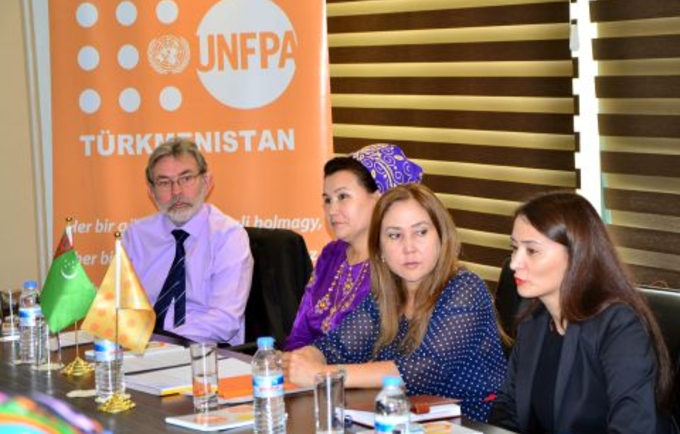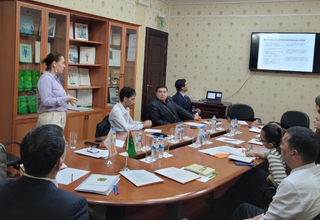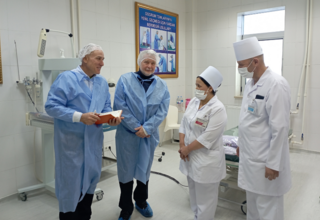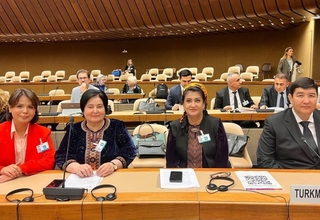Ashgabat, Turkmenistan - The Government of Turkmenistan is better prepared to prevent and treat cervical cancer, as a result of partnership with UNFPA, United Nations Population Fund.
The Ministry of Health and Medical Industry of Turkmenistan, with support of UNFPA, has developed and adopted a National Strategy of Turkmenistan on Response to Cervical Cancer and Breast Cancer Prevention in 2010, which outlines specific activities aimed at early detection and treatment. Since then, series of interventions have contributed to the national capacity development in the area of cervical cancer, including trainings on visual inspection using a solution of acetic acid, on colposcopy and cytology, among others.
This year UNFPA continues to provide technical support to the Ministry of Health and Medical Industry of Turkmenistan on the latest methods of prevention and treatment, as well as data collection in cervical cancer.
Cervical cancer is the second most frequent cancer among women of reproductive age in Turkmenistan, where it is associated with enormous personal distress, social disruption, and financial costs for women, their families, and the health systems. Good news is that unlike many other types of cancer, if early detected and effectively treated, the cervical cancer is one of the most preventable and successfully cured.
New opportunities for Turkmen women with new anti-cervical cancer vaccination

This year Turkmenistan will introduce a new vaccine against Human Papillomavirus (HPV), a virus that causes cervical cancer, which will have a major impact on the reproductive health of women in Turkmenistan. The government-sponsored vaccination will be procured within the framework of an agreement signed between the Government and United Nations Children’s Fund.
The vaccination will be free of charge and will already be available in 2016. The anti-cancer vaccine will be made to 9 year old girls and boys at polyclinics and secondary schools, to ensure maximum coverage.
For the vaccine to be effective, they should be given prior to exposure to the sexually-transmitted virus HPV. That is the main reason why this vaccination is recommended at such a young age, as the HPV vaccine offers long-lasting protection against HPV infection and HPV associated diseases.
Preteens should receive all doses of the HPV vaccine series long before they begin any type of sexual activity and, therefore, exposed to the HPV. Additionally, HPV vaccine produces a higher immune response in preteens than it does in older teens and young women, according to the Centers for Disease Control and Prevention. Therefore, the World Health Organization recommended target group for vaccination is 9 – 13 years old girls who have not yet become sexually active.
“Well-organized screening programmes can reduce cervical cancer rates by up to 80 per cent or by up to 90 per cent if combined with HPV vaccination of adolescent girls,” said Ms. Bayramgul Garabayeva, UNFPA Assistant Representative. “Introduction of the free HPV vaccination in Turkmenistan demonstrates the country’s ownership and commitment to achieving universal access to reproductive health services. UNFPA stands ready to continue the partnership with the Ministry of Health and Medical Industry in establishing the mechanisms and building capacities required to progressively implement the National Strategy on Response to Cervical Cancer and Breast Cancer Prevention, in order to ensure that the provided services are of high quality and can be equally accessed by all women and girls in Turkmenistan.”
National specialists equipped with the latest methods of cervical cancer treatment
 The latest methods of treatment of cervical cancer were presented to the oncologists and gynecologists in a workshop this week, organized by the Ministry of Health and Medical Industry and UNFPA, United Nations Population Fund with support of the Embassy of Israel in Turkmenistan.
The latest methods of treatment of cervical cancer were presented to the oncologists and gynecologists in a workshop this week, organized by the Ministry of Health and Medical Industry and UNFPA, United Nations Population Fund with support of the Embassy of Israel in Turkmenistan.
Dr. Aleksandr Rabinovich, international expert and cervical cancer researcher, facilitated the training and shared the modern methods of cervical cancer treatment. The expert also shared the latest algorithms of providing cervical cancer treatment and care.
“Standardizing delivery of quality care in cervical cancer is important, in order to manage cases diagnosed through screening,” said Dr. Kemal Goshliyev, UNFPA Reproductive Health National Programme Officer. “UNFPA support consists of advisory support to the Ministry in procurement of most efficient equipment and setting the algorithms for effective care.”
Improving data collection and monitoring through National Cervical Cancer Registry
 An important part of preventing and fighting the cervical cancer is improving the cancer research and records. UNFPA supports the Government of Turkmenistan in establishing the Cervical Cancer Registry to monitor long-term trends in disease incidence. The registry will also help assess the long-term impact of both HPV vaccination and cervical cancer screening and treatment programmes.
An important part of preventing and fighting the cervical cancer is improving the cancer research and records. UNFPA supports the Government of Turkmenistan in establishing the Cervical Cancer Registry to monitor long-term trends in disease incidence. The registry will also help assess the long-term impact of both HPV vaccination and cervical cancer screening and treatment programmes.
The Ministry of Health and Medical Industry, together with UNFPA and the Embassy of Israel, invited Dr. Jonathan Dubnov, public health expert, to help the national specialists establish the registry for different types of cancer, including cervical cancer.
“According to the World Health Organization data, more than 20 million new cases of cancer are predicted worldwide in 2025,” said Dr. Dubnov during his presentation. “Population-based cancer registries are a core component of cancer control strategies today. The registry serves as the evidence base for decreasing the cancer disease and mortality cases.”
The availability and reliability of disaggregated data on cervical cancer will be addressed while establishing the registry that meets the international standards.
The Ministry of Health has recently issued an Order on improving the data collection, and data on cancer is one of the priority areas to be addressed, according to the document. Within the framework of the fourth Country Programme 2016-2020, UNFPA will continue working closely with the Ministry of Health and Medical Industry in improving the quality of data and evidence-based analysis in the area of reproductive healthcare, including cervical cancer.
***
UNFPA: Delivering a world where every pregnancy is wanted, every childbirth is safe, and every young person’s potential is fulfilled.




